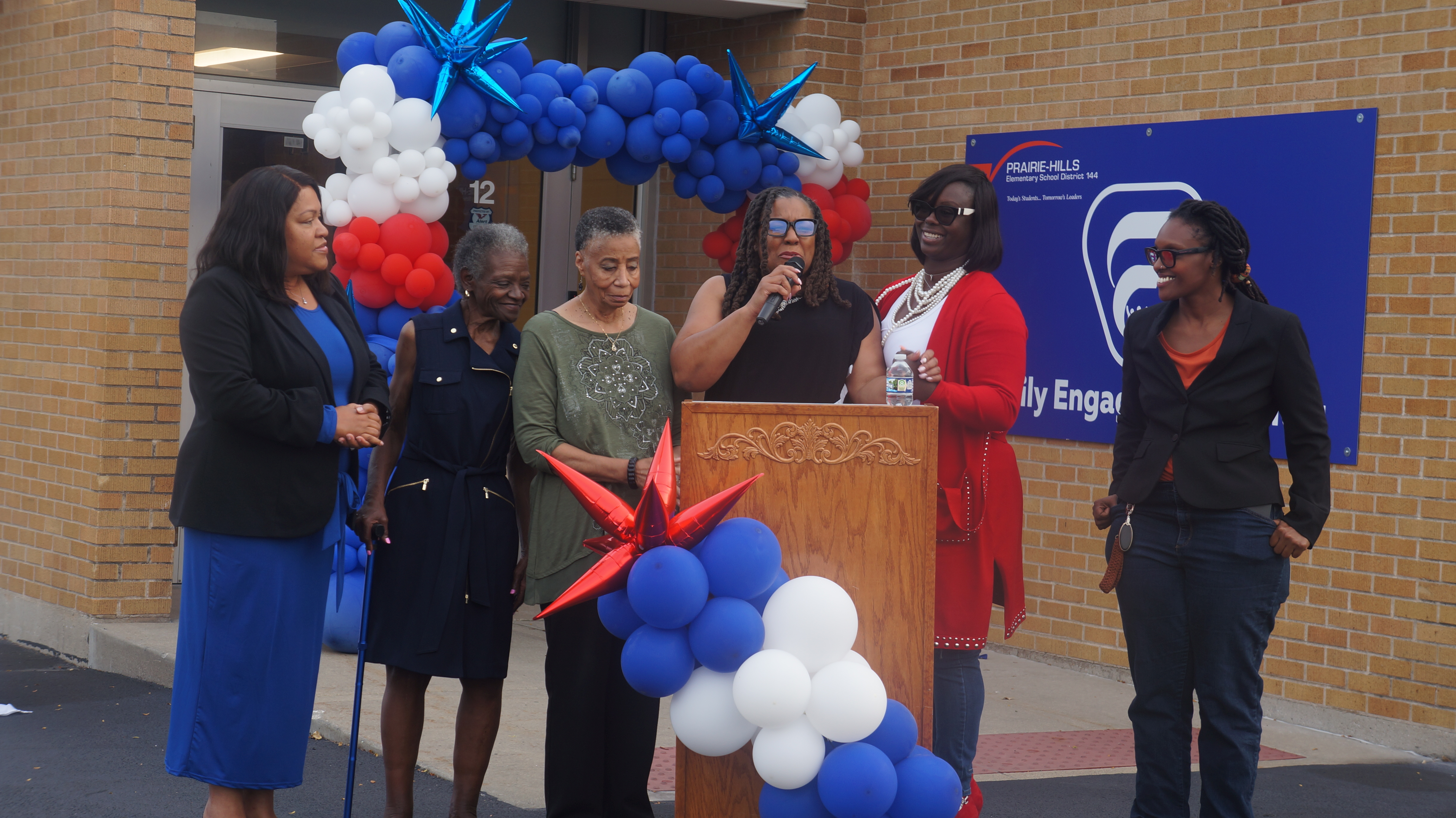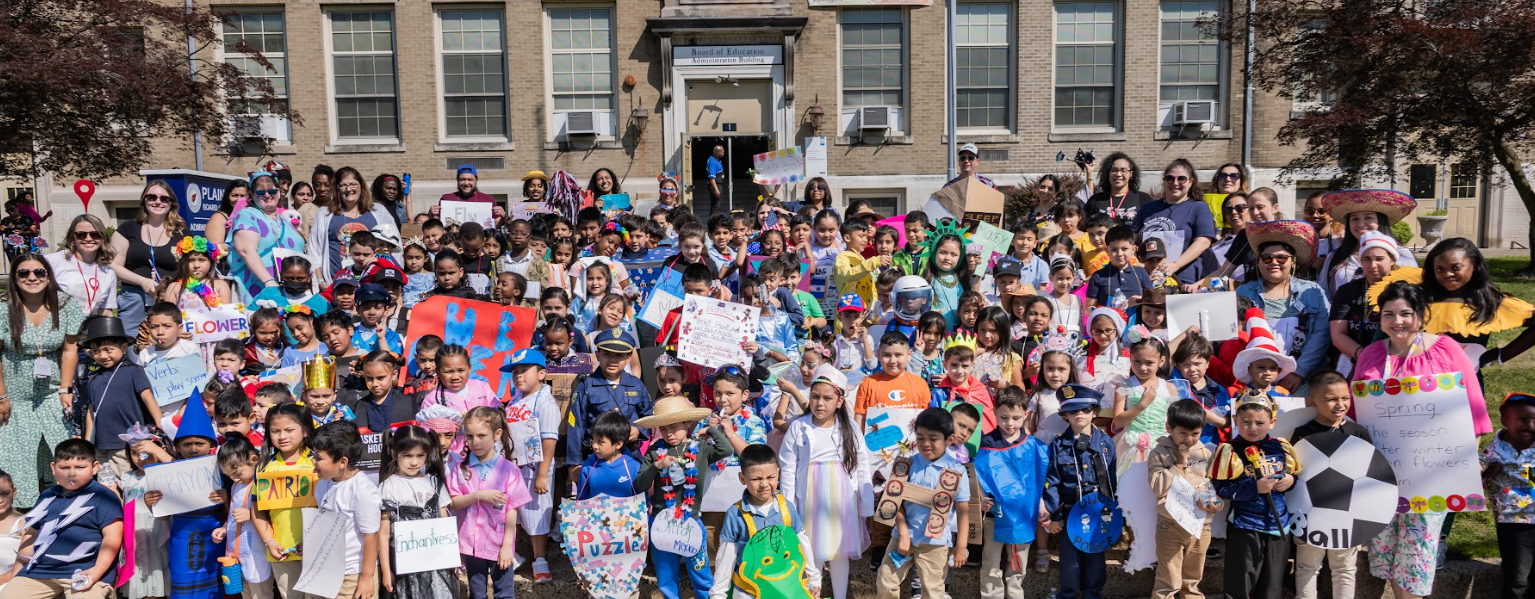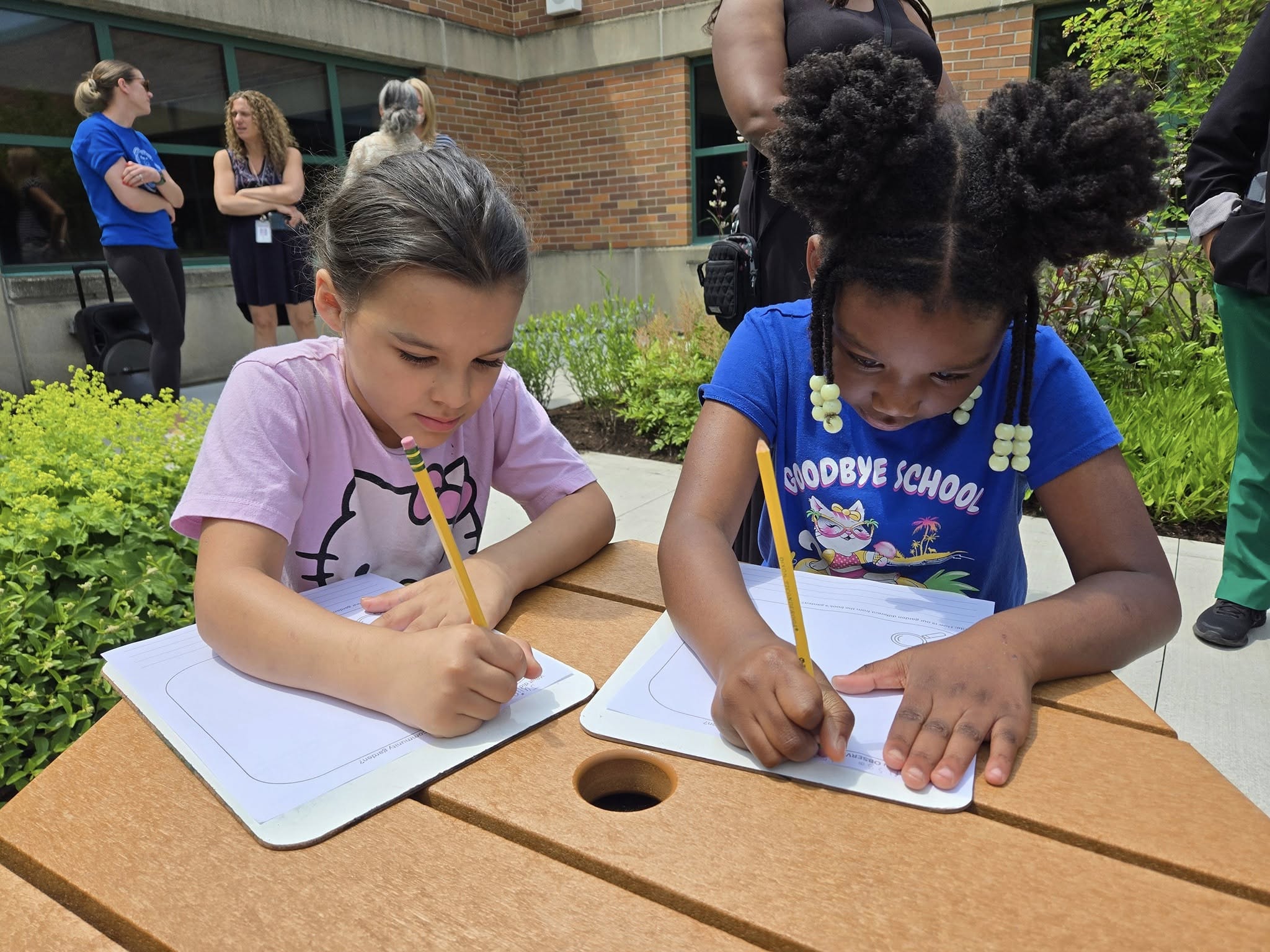Urban districts employ different methods to engage their community members
When schools connect with their families in meaningful ways, not only does communication between schools and parents improve, but this engagement can lead to higher grades, better test scores, and improved attendance and behavior. These urban districts show how they are overcoming barriers to school and family connection.
September 15, 2025

PRAIRIE-HILLS SCHOOL DISTRICT 144 CELEBRATES THE GRAND OPENING OF THE FAMILY ENGAGEMENT CENTER.
PHOTO COURTESY OF PRAIRIE-HILLS SCHOOL DISTRICT 144
When Kinasha Brown was appointed superintendent of Illinois’ Prairie-Hills Elementary School District 144 in 2023, the new district leader had several priorities. They included integrating herself into the community she was now serving, developing programs and engagement opportunities that would remove barriers to learning, and supporting all families across the district.
With a resume steeped in school improvement, Brown began by analyzing qualitative and quantitative demographic data about the 2,500-student Pre-K-8 school community in the south suburbs of Chicago. With that information, she produced an equity snapshot of the district, which helped her “dive into the community” and better understand its wants and needs.
Soon after, the district’s new Family Engagement Center launched several initiatives, including:
- The Hills Market Food Pantry, offered in partnership with the Greater Chicago Food Depository, to ensure families have access to free, fresh produce, pantry staples, and other nutritious foods.
- The Hills Boutique, which provides free school uniforms and other gently used and new clothing, household items, and school supplies.
- The Emergency Housing Support program, which offers assistance for families facing housing crises.
- The Share Your Genius Program, which provides extended learning opportunities to bridge educational gaps and promote personal growth.
Brown says, “We’ve had people throughout the community, from the churches, small business owners, moms, dads, aunties, who are like, ‘Hey, I love the kids. How can I help?’”
Their help has been translated into gymnastics and tumbling classes, martial arts lessons, art sessions, a financial literacy program, and a creative writing program, among others, all offered at no cost. The district’s Family, Community, and Business Engagement team manages these and other outreach efforts, focusing on “promoting healthy families and a healthy community,” Brown says. “Our board,” she adds, “has been very intentional about being fiscally responsible and making sure that we are doing things that are directly impacting our community and students.”
Numerous studies have shown that when schools connect with their families in meaningful ways, not only does communication between schools and parents improve, but this engagement can lead to higher grades, better test scores, and improved attendance and behavior. Family engagement also has been shown to help parents learn how to support learning at home.
“Family engagement is more than an education issue; for many families, it is a civil rights issue,” states the National Association for Family, School, and Community Engagement (NAFSCE). “Often, low-income families don’t have access or opportunity to becoming engaged in their child’s education. It is typically misunderstood as a parent’s lack of desire, and that is mistaken.”
Overcoming barriers to school and family is essential, says NAFSCE, adding that “without an intentional and strategic approach to culturally respond to, welcome and engage low-income families,” children in these families “are at a distinct disadvantage to achieve.”
A MORE STRATEGIC, DISTRICTWIDE MODEL
For Rashon Hasan, superintendent of New Jersey’s Plainfield Public Schools, family and community engagement “isn’t an afterthought—it’s the foundation of everything we do,” he says. The 10,000-student district is “building a school system where families are partners, not spectators. By listening to our community and designing with, not just for, them, we are creating schools that truly reflect and respond to the needs of our children.”
 PLAINFIELD PUBLIC SCHOOLS’ JEFFERSON ELEMENTARY STUDENTS DRESSED UP AND SHOWED OFF NEW WORDS THAT THEY LEARNED DURING A VOCABLUARY PARADE.
PLAINFIELD PUBLIC SCHOOLS’ JEFFERSON ELEMENTARY STUDENTS DRESSED UP AND SHOWED OFF NEW WORDS THAT THEY LEARNED DURING A VOCABLUARY PARADE.
PHOTO COURTESY OF PLAINFIELD PUBLIC SCHOOLS
(Hasan, as well as Brown of Prairie-Hills, presented education sessions on their districts’ community engagement efforts at the Council of Urban Boards of Education 2025 Annual Conference in September.)
While Plainfield Public Schools has a legacy of community involvement, Hasan’s arrival in 2023 has energized and expanded these efforts, with a shift from “isolated engagement events to a more strategic, districtwide model,” says Vashon Hill, chief of marketing and communications for the district.
Existing initiatives like the district’s Parent Academy and advisory councils have been enhanced with clearer goals, stronger accountability, and greater inclusivity. New initiatives, such as the Think Tank Book Club, Universal Preschool, and Student Advisory Council, reflect a growing emphasis on student voice, school climate, and whole-child development. Ultimately, the district strives to make families feel seen, heard, and empowered to support their children’s success, says Hill, who presented with Hasan at the CUBE Annual Conference.
A WHOLE CHILD MODEL
New York’s Buffalo Public Schools (BPS) started its Office of Strategic Alignment & Innovation (OSAI) nearly a decade ago to support student success and advance family and community engagement at 13 schools identified as likely to benefit from a whole child/community school model. Today, that approach to engagement has expanded districtwide, with 58 of the system’s 60 schools having designated community school initiatives, resources, and funding in place: 22 of the schools are identified as Community Schools; 36 are identified as Partnership Schools. (Two additional schools operate within other schools through which they receive engagement resources and services.)
Underlying both groups of schools in the 27,000-student district is “a whole child model to make sure that families and students are getting the basics that they need,” resulting in improved student learning, increased parent and family engagement, and healthier students, both physically and mentally, says Abigail Wolski, OSAI director. Through a range of programs supported by collaborations with local, regional, and national businesses, community and faith-based organizations, higher education, and government services, the district strives to invest in the success of students, their families, and communities around the schools. “This investment in our students is also an investment in the city of Buffalo,” Wolski says.
One of the most well-known of these programs is BPS’ Saturday Academies. Offered at the 22 community school sites, Saturday Academies feature educational, recreational, cultural, social, and wellness programs while also hosting vendors and activities for all ages. The schools, spread across the district’s four quadrants, choose seven to eight Saturdays throughout the school year to offer special programming and open their doors to the entire community. Having a BPS-enrolled student is not required to participate.
 STUDENTS DESCRIBE THE PLANTS AND INSECTS THAT THEY OBSERVED IN A NEW BUFFALO PUBLIC SCHOOLS COMMUNITY GARDEN DURING A DISTRICT SATURDAY ACADEMY EVENT.
STUDENTS DESCRIBE THE PLANTS AND INSECTS THAT THEY OBSERVED IN A NEW BUFFALO PUBLIC SCHOOLS COMMUNITY GARDEN DURING A DISTRICT SATURDAY ACADEMY EVENT.
PHOTO COURTESY OF BUFFALO PUBLIC SCHOOLS
Programs last year included hands-on STEM activities with drones, slime-making crafts, origami tutorials, yoga lessons, cooking demonstrations, CPR classes, and oral health exams. Almost 36,000 visitors engaged in a Saturday Academy program in 2024-25, Wolski says.
Partnerships with long-standing community-based organizations (CBOs), such as Say Yes Buffalo, are integral to the planning and funding of the events. CBOs, for example, employ Community School Navigators at each school, who work full-time to facilitate the development, implementation, and management of community school activities, events, programs, and services, including Saturday Academies.
Navigators also support the community school concept, from serving as lunch bunch buddies and mentors to acting as liaisons with families needing support services, Wolski says.
Her office frequently collaborates with various school district offices to highlight their services and offerings. Last year’s FAFSA Fest, for example, sponsored by the Guidance and Counseling Services Department, featured financial aid experts, college information, food, and giveaways to generate excitement and encourage participation in completing the critical financial aid application.
Another showcase brought together the districts’ high schools to promote their programs and support students’ understanding of college and career choices.
Because Saturday Academies are open to the entire community, they can spotlight district programs, resources, and partnerships that some residents may have been unfamiliar with, piquing their interest in the school district, Wolski says.
While Saturday Academies are open to all and offered at designated Community Schools on Saturdays, Partnership Schools also sponsor engagement programming, often in the evenings and specifically designed to engage the students and families of those schools. Programming is tailored around identified community needs and interests, such as mental health discussions, conflict resolution strategies, and academic enrichment needs.
In January 2024, Saturday Academies began hosting a series of Farmers Markets in partnership with BPS Food Service and Cornell University. Over 120 markets distributed 24,000 shares of free, local, fresh foods to the community. Attendance at the Saturday Academies “imploded” because of the popular markets, says Wolski, noting that the $1.7 million grant funding the program ended earlier this year. She is hopeful that another funding opportunity may soon be found to help address the problem of food insecurity in Buffalo.
THAT NEXT TARGETED LEVEL
If the Saturday Academies are about broad-based community-welcoming programming, BPS’s Department of Family and Community Engagement (FACE) is more about capacity building to ensure ongoing learning, wellness, and development of district families and staff. Operating out of four BPS Family Resource Center zones, FACE programming ranges from crafts and fitness to citizenship prep, reading comprehension, and suspension and special education workshops.
There are often “very targeted programs to help parents navigate school-based management team meetings, how to be a parent leader, how to start a PTO,” says director Jennifer Rich. “FACE is really about taking it to that next targeted level.” Parent Engagement Liaisons who can maneuver within the “culture and climate and different vibe” of each building are on staff and can help provide “a warm handoff” if parents need help connecting with local agencies and departments concerning food, housing, or other issues.
In its work to improve family engagement, BPS adopted the Dual Capacity-Building Framework for family-school partnerships developed by Karen Mapp, a professor of practice at Harvard University. The framework, which focuses on the best practices for collaboration and developing “meaningful, authentic, and trusting relationships between families and schools,” underscores BPS’ philosophy that “family engagement is not one department; family engagement is what we do as a district,” Rich says.
Best practices for family and community engagement include “identifying shared goals, co-designing programs with partners, and maintaining open, consistent communication,” agrees Plainfield Superintendent Hasan.
And that means truly hearing the community’s voice, says Superintendent Brown of Prairie-Hills: “In the name of trying to make things better, we have to ensure that we don’t take away that critical voice.”
Michelle Healy is senior editor of American School Board Journal.